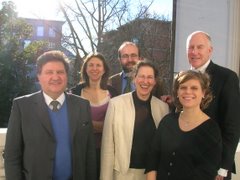A new paper on the Argumentum Model of Topics has just appeared on the journal Argumentation:
Comparing the Argumentum Model of Topics to Other Contemporary Approaches to Argument Schemes: The Procedural and Material Components
Eddo Rigotti and Sara Greco Morasso
See the ONLINE FIRST section from the homepage of Argumentation, from which the paper can be downloaded:
http://www.springerlink.com/content/102850/?Content+Status=Accepted
Abstract
This paper focuses on the inferential configuration of arguments, generally referred to as argument scheme. After outlining our approach, denominated Argumentum Model of Topics (AMT, see Rigotti and Greco Morasso 2006, 2009; Rigotti 2006, 2008, 2009), we compare it to other modern and contemporary approaches, to eventually illustrate some advantages offered by it. In spite of the evident connection with the tradition of topics, emerging also from AMT’s denomination, its involvement in the contemporary dialogue on argument schemes should not be overlooked. The model builds in particular on the theoretical and methodological perspective of pragma-dialectics in its extended version, reconciling dialectic and rhetoric; nevertheless, it also takes into account numerous other contributions to the study of argument schemes. Aiming at a representation of argument schemes able to monitor the inferential cohesion and completeness of arguments, AMT focuses on two components of argument scheme that could be distinguished, readapting pragma-dialectical terms, as procedural and material respectively. The procedural component is based on the semantic-ontological structure, which generates the inferential connection from which the logical form of the argument is derived. The material component integrates into the argument scheme the implicit and explicit premises bound to the contextual common ground (Rigotti 2006). In this paper, the comparison of the AMT to other approaches focuses on the inferential configuration of arguments and not on the typologies of argument schemes and on the principles they are based on, which the authors intend to tackle in a further paper.
Friday, 20 August 2010
Saturday, 7 August 2010
Welcome to ComCog2011
International Conference
Communication and Cognition 2011: Manipulation, Persuasion and Deception in Language
January 26-28 2011 - University of Neuchâtel, Switzerland
Read more on the CONFERENCE WEBSITE
The overall aim of this conference is to explore the various parameters that affect the way we process communicated information; as a case in point, this 2011 edition will focus on the issue of persuasive, manipulative, biased and fallacious verbal communication, with the goal of shedding light on different parameters that play a role in its 'success'. In this respect, we seek contributions which specifically focus on those (formal, informal, cognitive, linguistic and contextual) aspects of communication that orient the interpretation of language and fulfil argumentative and persuasive ends, be it in interpersonal or mass communication.
In the past, discursive manipulation and neighbouring phenomena such as lies, deception, persuasion and uncooperative communication, to name a few, have been investigated by a variety of researchers in numerous fields in the humanities and the social sciences. Among those are philosophy (e.g. Chisholm & Feehan 1977, Mahon 2007, Parret 1978); persuasion research (e.g. Petty & Cacioppo 1986, Chaiken 1987); linguistics, in particular pragmatics (e.g. Attardo 1997, Tanaka 1994, Blass 2005, Saussure 2005); cognitive linguistics (e.g. Chilton 2004); communication science (e.g. McCornack 1992, O'Keefe 2002); (critical) discourse analysis (e.g. Galasinski 2000, van Dijk 2006, Wodak 2007); argumentation theory (e.g. van Eemeren & Grootendorst 2004, Jacobs 1995), not to mention the classical tradition of rhetoric. However, the link between persuasive or deceptive communication and the cognitive underpinnings allowing for its success, already explored by trends in persuasion research, still needs to be fully drawn and understood, given that the available literature on the topic leaves too often aside the communicative dimension of manipulation and seldom aims for a psychologically plausible account of such communication-dependent phenomena.
Recent developments in cognitive science call for new research questions in the field of deceptive persuasion and manipulation through verbal communication, in particular in what regards the cognitive grounds of misguided and credulous interpretation - and more generally of gullibility (see Maillat & Oswald 2009). Emotions, trust, confidence and other attitudes have long been considered as keys for the effectiveness of persuasive language; the connotative load of certain keywords and more generally the role of the lexicon, as well as types of syntactic structures and other linguistic devices such as presuppositions have also been suspected to bear on the persuasive force of deceptive communication. However, little is known yet as to why and how these processes, including fallacious argumentation as a whole, jeopardize evaluation. Recent research in this growing field tends to confirm the hypothesis that communicative phenomena linked to deception and persuasion exploit cognitive biases and heuristics otherwise useful for the general economy of human communication. A long established concern for these cognitive biases and heuristics in information processing (see Wason 1966, 1968, Kahneman & Tversky 1974), which can in turn yield cognitive illusions and errors in information processing (see Pohl 2004), together with the input of cognitive anthropology (e.g. Mercier & Sperber, forth. Sperber et al. forth.) and developmental psychology (Mascaro & Sperber 2009, Clément 2010, Harris et al. forth.) opens a new promising trend of research on the persuasiveness of deceptive communication.
It is one of the purposes of this conference to stimulate interdisciplinary inquiry on these themes. Accordingly, contributions promoting an integration of different - yet complementary - trends into interdisciplinary models of information processing are encouraged. The organisers will particularly welcome papers located at the interface of the disciplines concerned, whether grounded on empirical evidence or presenting a theoretical model.
Communication and Cognition 2011: Manipulation, Persuasion and Deception in Language
January 26-28 2011 - University of Neuchâtel, Switzerland
Read more on the CONFERENCE WEBSITE
The overall aim of this conference is to explore the various parameters that affect the way we process communicated information; as a case in point, this 2011 edition will focus on the issue of persuasive, manipulative, biased and fallacious verbal communication, with the goal of shedding light on different parameters that play a role in its 'success'. In this respect, we seek contributions which specifically focus on those (formal, informal, cognitive, linguistic and contextual) aspects of communication that orient the interpretation of language and fulfil argumentative and persuasive ends, be it in interpersonal or mass communication.
In the past, discursive manipulation and neighbouring phenomena such as lies, deception, persuasion and uncooperative communication, to name a few, have been investigated by a variety of researchers in numerous fields in the humanities and the social sciences. Among those are philosophy (e.g. Chisholm & Feehan 1977, Mahon 2007, Parret 1978); persuasion research (e.g. Petty & Cacioppo 1986, Chaiken 1987); linguistics, in particular pragmatics (e.g. Attardo 1997, Tanaka 1994, Blass 2005, Saussure 2005); cognitive linguistics (e.g. Chilton 2004); communication science (e.g. McCornack 1992, O'Keefe 2002); (critical) discourse analysis (e.g. Galasinski 2000, van Dijk 2006, Wodak 2007); argumentation theory (e.g. van Eemeren & Grootendorst 2004, Jacobs 1995), not to mention the classical tradition of rhetoric. However, the link between persuasive or deceptive communication and the cognitive underpinnings allowing for its success, already explored by trends in persuasion research, still needs to be fully drawn and understood, given that the available literature on the topic leaves too often aside the communicative dimension of manipulation and seldom aims for a psychologically plausible account of such communication-dependent phenomena.
Recent developments in cognitive science call for new research questions in the field of deceptive persuasion and manipulation through verbal communication, in particular in what regards the cognitive grounds of misguided and credulous interpretation - and more generally of gullibility (see Maillat & Oswald 2009). Emotions, trust, confidence and other attitudes have long been considered as keys for the effectiveness of persuasive language; the connotative load of certain keywords and more generally the role of the lexicon, as well as types of syntactic structures and other linguistic devices such as presuppositions have also been suspected to bear on the persuasive force of deceptive communication. However, little is known yet as to why and how these processes, including fallacious argumentation as a whole, jeopardize evaluation. Recent research in this growing field tends to confirm the hypothesis that communicative phenomena linked to deception and persuasion exploit cognitive biases and heuristics otherwise useful for the general economy of human communication. A long established concern for these cognitive biases and heuristics in information processing (see Wason 1966, 1968, Kahneman & Tversky 1974), which can in turn yield cognitive illusions and errors in information processing (see Pohl 2004), together with the input of cognitive anthropology (e.g. Mercier & Sperber, forth. Sperber et al. forth.) and developmental psychology (Mascaro & Sperber 2009, Clément 2010, Harris et al. forth.) opens a new promising trend of research on the persuasiveness of deceptive communication.
It is one of the purposes of this conference to stimulate interdisciplinary inquiry on these themes. Accordingly, contributions promoting an integration of different - yet complementary - trends into interdisciplinary models of information processing are encouraged. The organisers will particularly welcome papers located at the interface of the disciplines concerned, whether grounded on empirical evidence or presenting a theoretical model.
Subscribe to:
Comments (Atom)


